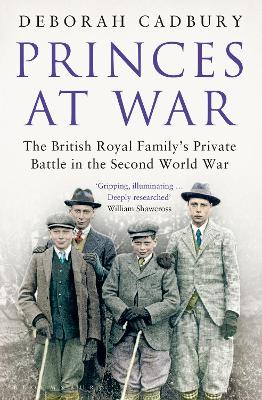
jesstheaudiobookworm
Written on Jun 28, 2019
Princes at War takes us step-by-step through the abdication crisis and World War II. I know that World War II is of particularly great interest to many historians and history enthusiasts, but it has never been my jam. I much prefer the Edwardian and Victorian eras. This was the first audiobook I've heard that so heavily dealt with the subject of the second world war. Of course, I'm familiar with the major events from school, but what made Princes at War so intriguing was that the events were told from a royal perspective. As an avid royal history enthusiast, I ate it up and asked for more.
I began listening under the impression that the book would focus on The Duke of Windsor and George VI. That's where most authors tend to focus, given the drama surrounding the abdication crisis. But I was delighted upon realizing that Deborah Cadbury had devoted significant chunks of her book to the other two brothers, The Duke of Gloucester and The Duke of Kent. Last year, I heard another audiobook centering on The Duke and Duchess of Kent, but I have yet to find one that provides so much information on Prince Henry, Duke of Gloucester. He must seem a bit of a bore to biographers since he was not involved in the abdication crisis and did not die a tragically young death. It was enlightening to learn how much George VI leaned on The Duke of Gloucester, with the latter often serving as regent during Princess Elizabeth's minority, and of the effect that had on their relationship.
Having already read titles focusing on George V and Queen Mary, The Duke and Duchess of Kent, and The Duke and Duchess of Windsor, Princes at War filled in a lot of the gaps where The Duke of Gloucester was concerned. It also provided a more inflammatory view of The Duke and Duchess of Windsor's activities during that time. I have found that works centering around that particular couple tend to be bipolar, either romanticized or scandalized, with very little overlap. Princes at War didn't pull any punches. There were hard-hitting allegations of treason on the part of The Duke of Windsor and Wallis was basically called a Nazi spy. I've never read anything so direct with its implications. Like I said, most material on the matter either falls into the "greatest love story ever told" category or the "gold-digging Nazi spy" category. This was the definitely latter, so if you're one of those who likes to romanticize the Windsor's relationship, you'll definitely want to stay away from Princes at War.
For me, the directness of such claims was hard to swallow at first, but Princes at War frequently sites official military intelligence and letters of the time as sources, so it seems pretty legit. It's looking more and more likely that some sort of revisionary cover up happened, so I'm planning on hearing 17 Carnations soon to compare accounts. The only other Wallis Simpson biography I've heard downplays the whole ordeal, which piques my interest further.
I was expecting Princes at War to be a rehashing of a story I've heard 1000 times, but it ended up giving me a lot more new information than I expected. Not only was there new information given, but it left me with new questions I'm eager to have answered.
Narration review: Veida Dehmlow did a fine job of narrating princes at war. Her performance was engaging enough to easily hold my attention, while still lending an air of seriousness and respectability to the work. She offered a few accents here and there, which seemed appropriate considering the multitude of countries and characters involved. But I did notice that she never attempted an American accent. It would have been especially appropriate, given the dominating presence of Wallis Simpson in the narrative, but it may have been that Dehmlow did not feel comfortable attempting such an accent, in which case I applaud her judgment. ♣︎
